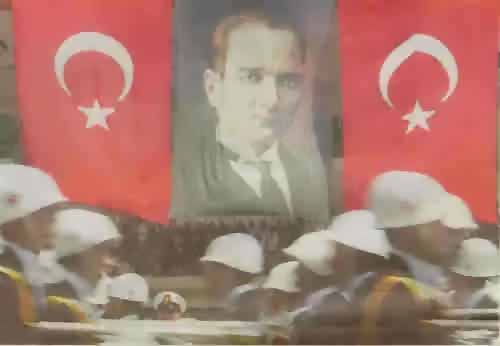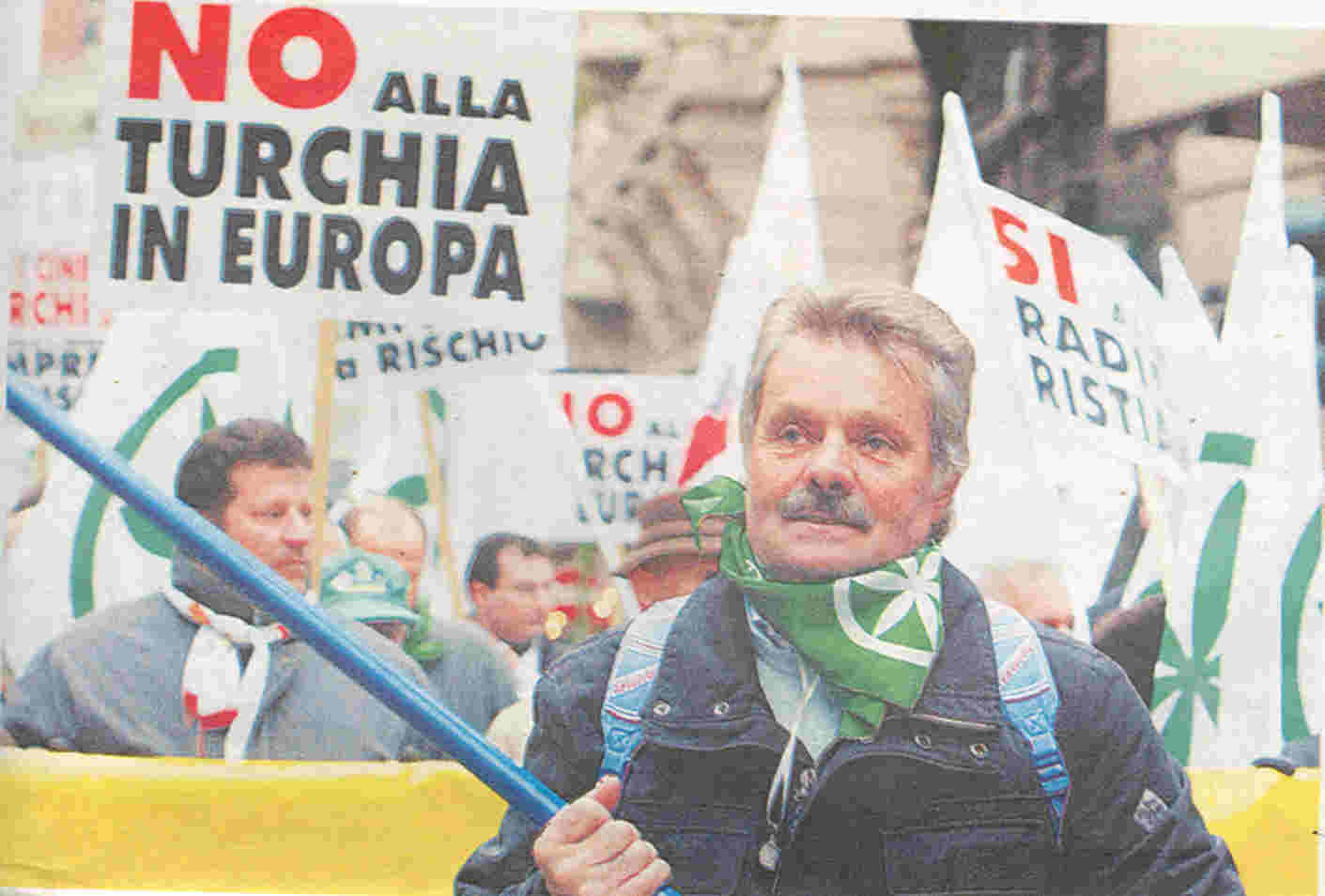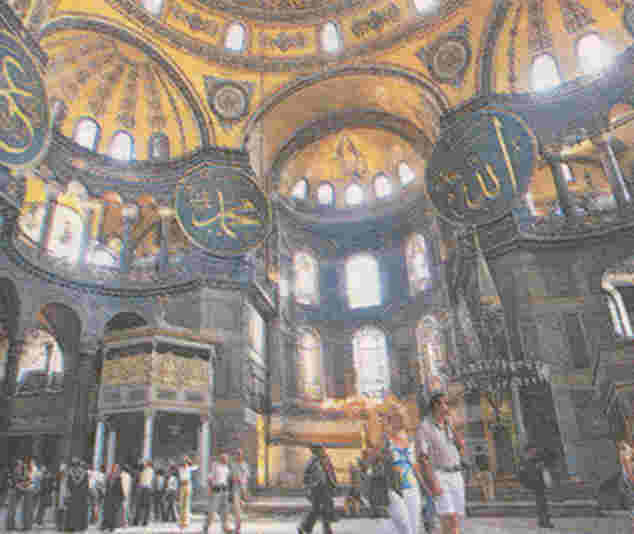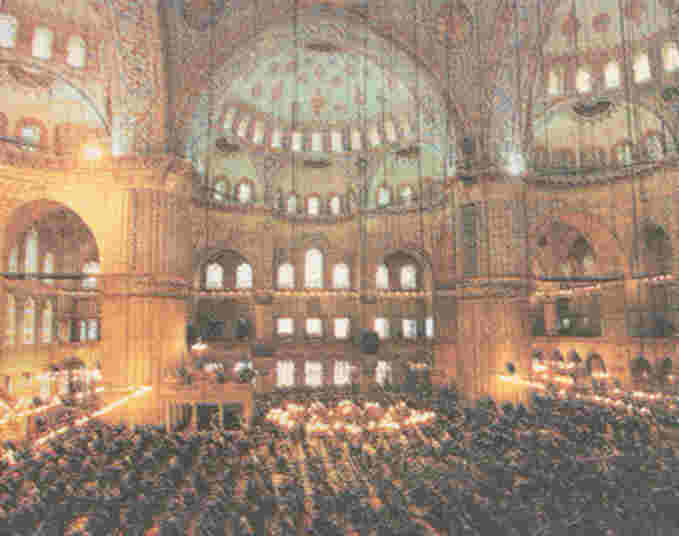 |
||
|
On The Road to EU Turkey and the West: From the Ottomans to the EU - Part 2 Athens News |
||
|
Turkey has had a complex relationship with the West, spanning several centuries. In the last of three installments, Frederick Reece traces Turkey's reforms led by Ataturk to those driven by Turkey's quest to join the EU
|
||
While many of Ataturk's reforms were greeted with enthusiasm, or at least acceptance, in matters of religion he walked on the most dangerous ground. He firmly believed that the collapse of the Ottoman Empire was due in large part to the influence of a stagnant Islamic orthodoxy entrenched in positions of authority. By attempting to move religion outside the realm of the state, he demonstrated a willingness to exceed the Ottoman reformers of previous eras. However, he also experienced the most extreme counter-reaction on this point, as the bloody religious riots in Menemen, near Izmir, amply demonstrated. To this day, Ataturk's ideas about Islam and their suitability within an almost exclusively Muslim society remain a point of some contention within Turkey. During the rise of totalitarian states in the run-up to World War Two, Ataturk sought to strengthen his ties to Western nations while remaining wary of any alliances that might draw Turkey into another disastrous war. In the early 1930s, Turkey joined the League of Nations and signed a non-aggression pact with the Soviets. It also strengthened ties to the United States. When Italy invaded Ethiopia, Turkey supported sanctions against Italy and successfully gained control over the Turkish Straights. |
See Also: The Tourkokratia - Was it Really That Bad? Part 2A Turks or Trojans? Part 3 The Tourkokratia - Was it Really That Bad? Part 3A  A military band marches past a banner of Kemal Ataturk, founder of the Turkish Republic, at Inonu Stadium in Istanbul. A 1960 military intervention in domestic political affairs established a pattern that was followed in subsequent decades. The role of the military is among the key issues the European Union will be monitoring during the long accession talks with Ankara |
|
| As conflict in Europe intensified, Ataturk's personal situation grew grimmer. He had long been used to a vigorous life of politics and warfare. After the establish of the Republic, he threw himself into the aforementioned campaign or reforms, touring the country to teach villagers the Latin alphabet or to demonstrate by personal example the suitability of Western clothing. Long years of hard work and nights of strategizing with subordinates, frequently accompanied by bottles of raki, the Turkish national drink, had taken their toll on Ataturk's health. In the autumn of 1938, recognizing the approach of death, Ataturk holed up in Dolmabahce Palace, on the shores of the Bosphorus. Unable to deliver his annual speech in Ankara celebrating the fifteenth anniversary of the Republic he listened from his bed to the report of celebratory fireworks. Twelve days later he died, his health fatally compromised by the intensities of his own personality. Ataturk once said to his people, ''There are two Mustafa Kemals. One of them is he who stands before you, the Mustafa Kemal of flesh and blood who will pass away. There is another though, whom I cannot call 'me', for it is not I whom this Mustafa Kemal personifies. "It is you - all you here present - who go to the further most parts of the country to inculcate an ideal which must be defended....It is a new mode of thought and I stand for these dreams of yours... my life's work is to make them come true..." The desperate condition from which the Turks had extricated themselves after the First World War, the cult of Great Leaders that flourished in the 1930s and 40s, and Ataturk's own undeniable magnetism made it inevitable that he would come to embody for the Turkish people a movement toward something, national hope, development, or salvation, that would occupy them throughout the rest of the 20th century. After Ataturk In the wake of Ataturk's death, the public, under President Ismet Inonu, was preoccupied with its handling of events surrounding the Second World War. Turkey's primary motivation was to remain safely neutral for as long as possible. However, the Italian occupation of Albania in 1939 prompted fears of Mussolini's designs on Turkish Territory. Turkey thus signed cooperative agreements with France and Britain, though she was militarily unprepared to contribute much to the Allied effort. With Germany's occupation of Greece and Bulgaria's membership in the Axis powers, Inonu felt obligated to sign a treaty of friendship with the Germans. This diplomatic balancing act may have damaged Turkey's international reputation, but it did serve to keep the Republic out of the war until its outcome was certain. In February of 1945, Turkey formally declared war on Germany, largely to guarantee itself a position of greater standing in the United Nations. In the years following World War II, the government of Ismet Inonu grew increasingly unpopular. Various reform measures generated little improvement in the lives of most Turks, and the one-party system made it inevitable that all discontent would be vented on the current regime. Turkey's integration into the Western security system, including its membership in Nato and the Council of Europe, combined with popular discontent led to pressure for democratic rule. In 1950, Inonu, the only president since Ataturk's death, was replaced by Celal Bayar, and Adnan Menderes became Prime Minister. The two ushered in an era of political liberalization and economic development. Turkish participation in the Korean conflict strengthened the Western perception of Turkey as a dependable ally moving domestically in the proper direction. However, as economic difficulties plagued the regime in the mid-1950s, Menderes grew indecisive and the Turkish military restive. A bloodless coup removed Menderes and Bayar from power in 1960 and installed General Cemal Gursel as temporary head of state. This military intervention in domestic political affairs established a pattern that would be followed in subsequent decades. The military justified its action as a protection of the Republic's security, established what they considered to be an acceptable climate of order, and then restored power to the politicians. Such a process, however, has had a distorting effect on Turkish democracy. Firstly, it calls into question the ultimate authority of the voting public in allocating political power. It has also led to a kind of complacency among the voters themselves, a feeling that they and their elected representatives can flirt with any number of dangerous policies, and if the results turn out unfavourably, the military will step in to set things right. However, in the case of the 1960 coup, the military must be given credit for sponsoring a more genuinely democratic system defined by a new constitution. The 1960s saw tensions rise with both Greece and the United States over the issue of Cyprus. The Turkish government felt that the Americans impartially favoured the Greek position, leading to diplomatic wrangling and resentment. Turkish leftists also launched increasingly severe criticism -and terrorist activities - against the American and Nato presence in Turkey. The US peace Corps, an economic and educational development agency, had to withdraw its workers under the mounting suspicion that they were CIA spies. Anti-American and anti-Nato sentiments reached their high point in 1971, and were no longer confined to democratic channels. Regarding the crisis, the Turkish General Staff sent a letter of warning to Prime Minister Suleymam Demirel, who subsequently stepped down. This triggered a series of leftist kidnappings and murders, followed by widespread government crackdowns on suspected terrorists and their sympathizers. Martial law was declared, followed by a succession of coalition governments. By the late 1970s, Turkey was suffering from escalating economic problems coupled with political turmoil. The economic crisis was alleviated when Prime Minister Demirel brought Turgut Ozal into his cabinet as an economic administrator. Ozal initiated a series of economic reforms that lay the foundation for Turkey's economic resurgence in the1980s. However, the political situation remained precarious, with political terrorism emanating from both the Left and the Right. Again, the military stepped in. The Generals, along with a substantial percentage of the population, saw this as necessary to save the Republic from a failed political system. Yet again, a new constitution was enacted, coupled with widespread arrests of political suspects. The arrests and interrogations drew international criticism from organizations such as Amnesty International. Nevertheless, the Republic survived and in the intervening years has sustained democratic elections without resorting to further military intervention. Still, everyone in Turkey knows that the political process is to some degree circumscribed by the tolerance of the military establishment. Opinions today are divided as to the extent to which this is good. |
||
 Many Europeans are opposed to the prospect of Turkey's joining the EU but it was in Milan that thousands of Northern League supporters took to the streets on December 19 to demonstrate against the EU decsion to open membership talks with Turkey next October. A banner in the background reads 'No to Turkey in Europe' |
Turkey and the European Union Turkey has over the past twenty years focused increasingly on economic development by building up its export base. This has led naturally to the Turkish bid to join the European Union. In 1996, Turkey joined the European Customs Union, granting it easier access to European markets and aid for economic development. This is widely seen in both Europe and Turkey as a crucial step on the way to full EU membership. However, many Turks, even those pro EU membership, fear that their Customs Union membership will become an indefinite interim position. (Editors note: the article was written before the European Union summit decided on December 17 to give Turkey October 3 as a starting date for accession talks.). Many citizens will tolerate EU regulations in exchange for a place in the EU, but will resent it if they see their way blocked. The cultural and religious identity of Turkey has emerged as a prime sticking point. |
|
|
The recent murder of Dutch filmmaker Theo Van Gogh by an Islamic extremist has revived questions in Europe about Muslim integration into contemporary European society. While this has long been a topic of underground discussion, it is no longer taboo, even in polite journalistic circles. Given that the Turkish population will soon exceed that of Germany, currently the EU's largest nation, there is concern in Europe about a large influx of Turks with full immigration rights under the EU. In Turkey, this fear is often characterized as the latest manifestation of the centuries long struggle between Islam and the Christian West. However, the passion for Christianity in Europe seems to have subsided over the past century into something resembling an easy going, secular consumerism, underpinned by stable democratic systems and perhaps some personal nod to one or another mystical fad. If the European soul can be described, it seems that Christianity per se is a receding and vestigial element. European concerns about Turkey as an EU member are not only cultural, however. As more and more Eastern European states become candidates for membership, it becomes unclear as to whether their limping economies can be sustained through EU subsidies. Throw into the mix a nation of approximately 70 million citizens, and growing, and many Eurocrats in Brussels grow pale. This factor combined with cultural differences between Europe and Turkey has led a growing number of Turks to doubt the sincerity of Europe's promises. For economic and geopolitical reasons, they suspect, Europe will attempt to keep Turkey within its economic and diplomatic orbit, but outside of the European home. As a Turkish specialist in international relations puts it, "... the EU has some indispensable interests in keeping Turkey close to itself, if not inside its gates. The Europeans fear that if they turn Turkey down, she may adopt, as a reaction, some policies in conflict with European interests. Also, the EU cannot openly admit the reasons behind its behaviour because these run counter to the EU's own principles... In the final analysis, it is already clear that even if Turkey eventually meets the political and economic criteria for membership, an important bloc within the EU will continue to oppose its membership on cultural grounds." The majority of Turks continue to support the nation's bid for EU membership, believing that, in the long run, its benefits will justify the political and social compromises necessary to gain European approval. However, the very notion of repeatedly having to modify one's political and economic practices in order to gain acceptance has inevitably lent strength to the voices of sceptics, who question whether Turkey's long journey to gain a place in Europe is possible, or even desirable. It is, in many ways, a journey begun centuries ago. |
||
 Interior of the Byzantine church St. Sophia |
 Interior of the Byzantine Church Blue Mosque in Istanbul |
|
|
Postscript ISTANBUL is a city famous for its mixture of peoples and histories. I visited the city in November for the Seker Bayram, the festival marking the end of Ramazan. At night, the streets were alive with families dining and strolling, and a small fair ground lured the children onto rides. During the day, the city's smaller mosques were strained by the faithful, and mats had to be spread on the sidewalks to accommodate afternoon prayers. Two of Istanbul's greatest structures are Ayasofia (St Sophia) and the Sultanahmet Mosque, perhaps better known is the Blue Mosque. Emperor Justinian ordered the construction of Ayasofia in 537, and for centuries it remained the greatest church in Christendom. Inside, one experiences an immense,dark, cavernous space. Christian iconography mingles with large wooden medallions inscribed with Arabic calligraphy. It is a curious sight. When Constantinople fell to the Turks in 1453, Mehmet the Conqueror claimed Ayasofia for Islam. Before entering, however, legend has it that he sprinkled his head with dirt, a gesture of humility. In 1609 Ahmet I appointed his court architect to build a rival, wholly Islamic structure meant to out do the Byzantine monument no more than a few hundred meters away. The result was the Blue Mosque, which we visited one evening after dinner. The mosque was alive with devotees, tourists, and locals just hanging around. The doorman to the mosque took our shoes, as per custom, and placd them in plastic bags to await us. Inside, the space was light and open, and we wandered quietly at the back, where children played and one or two tourists violated the atmosphere of sanctity, as they do everywhere, by snapping forbidden photographs. Meanwhile, farther to the front, a scattering of men prayed silently. Emerging from the Mosque, my wife and I chatted in English. The doorman, mistaking the language of our conversation, spoke to us in German. My wife replied in Turkish, to which the doorman responded in English. An exchange of the type one gets used to in Turkey. Then the doorman addressed me. "So, you have now seen the Blue Mosque," he said. I nodded or smiled. "What do you think?" His voice carried only the slightest flavour of proprietary pleasure, the pride of the host seeking in the eyes of a visitor some flicker of regard. "What do you think?" A simple, innocuous question that the foreign visitor to Turkey can expect to encounter more than once. |
||
HCS readers can view other excellent articles by the Athens News writers and staff in many sections of our extensive, permanent archives, especially our News & Issues, Travel in Greece, Business, and Food, Recipes & Garden sections at the URL http://www.helleniccomserve.com./contents.html
All articles of Athens News appearing on HCS have been reprinted with permission. |
||
 |
||
|
2000 © Hellenic Communication Service, L.L.C. All Rights Reserved. http://www.HellenicComServe.com |
||
